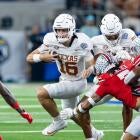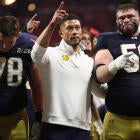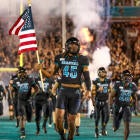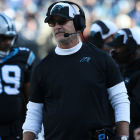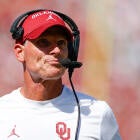
The NCAA Division I Council proposed new rules that would cut the transfer portal duration in half, along with dramatically impacting membership requirements at the Football Bowl Subdivision level during a meeting in Indianapolis this week. The proposals will go to the Division I membership and various advisory committees for consideration before being voted on at a future meeting, potentially as soon as October.
If passed, players will only have a 30-day window to submit their names to the transfer portal. Current rules allow for 45 days after conference championship games and an additional 15 days at the conclusion of spring practices (between April 15-30). If amended, it's likely the first window would simply be reduced to 15 days, while the second window will remain unchanged.
Additionally, the Division I Council is eyeing new guardrails to limit the number of institutions targeting moves from the Football Championship Subdivision (FCS) to the FBS. Most notably, the one-time fee to transition levels has exploded from $5,000 to $5 million as the NCAA tilts the scale from fan support to institutional support.
Here is a list of other NCAA transitionary requirements, which would take effect Aug. 1, 2027, for both existing FBS members and schools transitioning to FBS:
- Schools must fund 90% of total allowable scholarships in at least 16 sports over a two-year period, including football. The number requires all FBS football programs to fund at least 77 football scholarships of 85 allowable.
- Institutions must offer at least 210 total scholarships and at least $6 million in scholarships across all sports.
- The NCAA would eliminate attendance requirements, which currently demand schools field at least 15,000 fans per game over a two-year period.
There has been a feeding frenzy over the past 15 years as numerous schools have either transitioned up or started FBS programs. With Sam Houston and Jacksonville State joining FBS in 2023, 11 schools will have made the jump since 2008. Four other schools -- UTSA, Charlotte, Georgia State and South Alabama -- created programs with short stopovers in FCS before joining the FBS ranks. Kennesaw State will become the 16th overall to move from FCS to FBS in 2024.
While the number of FBS programs has exploded, fan interest has lessened. In 2022, 13 FBS institutions failed to reach the 15,000 attendance threshold. A year prior, the number was 18, though attendance was down across sports in the aftermath of the COVID-19 pandemic. Eight additional schools posted between 15,000 and 16,000 tickets purchased per game.
"These requirements will directly benefit college athletes competing in Division I sports by requiring significant investment in scholarship opportunities," said Jon Steinbrecher, MAC commissioner and vice chair of the D-I Council. "Over the past several years, the NCAA's collected data about spending at FBS schools indicate that these requirements are reasonable and attainable for the majority of impacted athletics programs."
Gambling clarity
In the wake of multiple gambling investigations, including those at Iowa and Iowa State, the NCAA Legislative Committee passed clear rules to punish gambling offenders. The new legislation will target any violations reported later than May 2 and include the following punishments:
- Players who gamble on their own games or games at their own school will permanently lose collegiate eligibility.
- If a player gambles on their own sport at another school, the player could face suspension of up to 50% of a season and mandated to take classes on preventing sports wagering.
- Gambling on any other sports will have a sliding scale based on the dollar figures of the bets. Less than $200 necessitates only gambling classes; between $201 and $500 features up to 10% of a season suspension; $501-$800 pushes it to 20%; greater than $800 includes loss of 30% of a season.
Previously, any college athlete found to have bet on sports at any level could face a one-year suspension. However, the rise of sports gambling in America -- which includes partnerships and data sharing agreements involving schools and athletic conferences -- only complicates matters.
Iowa State notably is investigating at least 15 players across multiple sports, including football, for sports gambling. Iowa is similarly investigating 26 players across multiple sports, along with at least one athletic department individual. Gambling is legal in the state of Iowa, but not for college athletes.
![[object Object] Logo](https://sportshub.cbsistatic.com/i/2020/04/22/e9ceb731-8b3f-4c60-98fe-090ab66a2997/screen-shot-2020-04-22-at-11-04-56-am.png)








